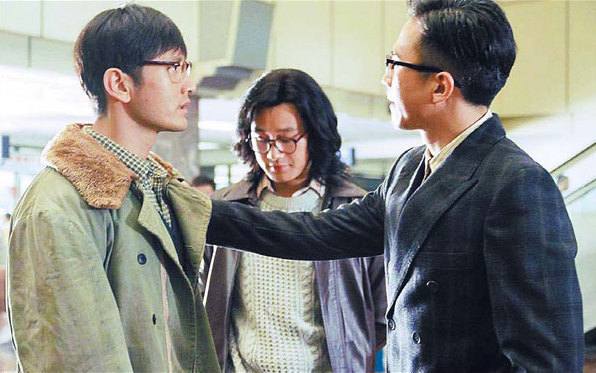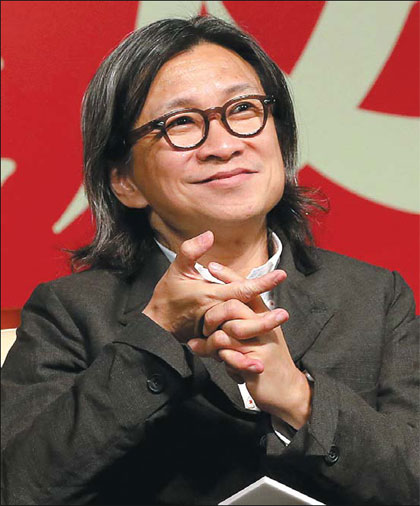Dreaming in Chinese
Updated: 2013-05-22 05:38
By Liu Wei (China Daily)
|
||||||||
|
A scene from Hong Kong director Peter Chan's new film American Dreams in China. Provided to China Daily |
Limelight | Peter Chan
New Oriental is a Chinese business success story, and now a Hong Kong filmmaker has brought the story of this English-language company to the big screen. Liu Wei chats with director Peter Chan.
In 1993, three young men started an English training class, which has grown to become the largest private educational service provider in the Chinese mainland.
Now, a Hong Kong director has brought the story of New Oriental to the big screen in the film American Dreams in China.
"To me, the 'American dream' is going from rags to riches by fair play," says Peter Chan, director of smash hits such as Comrades: Almost a Love Story and The Warlords. "It does not necessarily happen in the United States, actually over the last 30 years, it has happened most frequently in the Chinese mainland."
The story of New Oriental is a classic rags to riches tale. When Yu Minhong, a former English teacher at Peking University spent all night posting advertisements for his TOEFL and GRE classes on Beijing's lamp posts, he probably did not realize he was launching an educational empire that would grow to boast 17,400 teachers and 2.4 million enrollments in 2012 alone.
The year was 1993 - 15 years after China decided to revive its economy by reform and opening up. Tens of thousands of young people left China to see the world and many of them chose to study in the US. Yu's English class and these young Chinese eager to connect with the rest of the world benefited each other.
One scene in the film illustrates how drastic social change has been over the past 30 years and its impact on individuals. When the protagonist, loosely based on Yu Minhong, makes lots of money for the first time, he throws the notes into the air in excitement.
Chan said he personally does not find the scene, written by his scriptwriters, believable. He protested that it felt a bit fake, but almost everyone on his mainland team, including actors, scriptwriters, and even editors, told him they had done the same thing when they first started making money. Han Sanping, chairman of China Film Group and one of the film's producers, told Chan he should have made the scene longer.
"The special era has made many things dramatic and romantic, which fascinates me," Chan says.
Money, however, comes with its own problems. In 2006, New Oriental became the first Chinese educational institution listed on the New York Stock Exchange, but as the company grew, Yu and his co-founders Xu Xiaoping and Wang Qiang started to clash. Xu and Wang are no longer managing New Oriental and run their own venture capital firm.
Chan's film ends when the company is listed on the NYSE.
"Before the company gets listed, the shares the three friends fight for stand for dignity, but after entering the stock market, the shares stand for real money, that is when things get ugly," he says.
He does not want to make a Chinese version of The Social Network, David Fincher's film about the founding of Facebook that features the breakdown of the relationship between the founders.
"If my film has a sequel, that could be another The Social Network," the 51-year-old director says. "It is not that I am more optimistic about humanity now, I am not, but at my age I have accepted the fact that life is unhappy and humanity is flawed. I cannot change it, but I no longer want it to bother me."
American Dreams in China is therefore not a deep exploration of modern business but focuses more on how the three good friends work together to establish the company and how their friendship survives in the business world.
"This is a film that makes me happy and I am sure the audiences happy, too," he says.
Many of the films' gags come from Chan's two mainland scriptwriters, who have a better idea of what life in Beijing was like in the 1990s. Chan did not live in Beijing at the time the film is set, but there are some scenes he insisted on including in the final cut.
One shows the protagonist teaching in a Kentucky Fried Chicken restaurant because he does not have enough money to rent a classroom. The restaurant chain entered China in 1987 and was considered a high-status landmark at that time.
When more students started to sign up for classes, they move to a factory, because many workers were laid off in the 1990s and the factories were left empty. In the factory, hundreds of students shine torches and repeat English words.
"These scenes did not actually happen, but they are closely connected to some important moments in that era. I represent these moments in my own way of storytelling," Chan says.
He cannot make a film that is totally realistic, Chan adds. In his romance film Comrades: Almost a Love Story, he had a Hong Kong gang lord sport a tattoo of Mickey Mouse. He describes his aesthetics as a bit fantastic and super-realistic, a view of the world shaped by his background.
Born in Hong Kong, Chan moved to Thailand with his parents at age 11 and studied in the US before he returned to Hong Kong at 21. He directed The Love Letter in Hollywood in 1999, and was one of the earliest Hong Kong filmmakers to explore the mainland market.
"I always feel I am an outsider, but I accept it as a good thing," he says. "I understand things, but I stand at a distance to find something special. This point of view helps me make films that are different and fun," he says.
Chan says the making of American Dreams in China has been a delightful and relaxing experience for him. Chan says if he has learned one thing from the film, it is what a dream is.
"Everyone has his or her own dream," he says, "but often only one out of 100 people realizes his or her dream. But the reason the dream is valuable is not because of the one person who realizes it, but about how that one person makes the other 99 believe they can realize their dreams and fight for it."
The film premiered on May 17.
Contact the writer at liuw@chinadaily.com.cn.
|
Peter Chan is one of the most successful Hong Kong filmmakers in the mainland market. Jiang Dong / China Daily |
(China Daily 05/22/2013 page18)

 Michelle lays roses at site along Berlin Wall
Michelle lays roses at site along Berlin Wall
 Historic space lecture in Tiangong-1 commences
Historic space lecture in Tiangong-1 commences
 'Sopranos' Star James Gandolfini dead at 51
'Sopranos' Star James Gandolfini dead at 51
 UN: Number of refugees hits 18-year high
UN: Number of refugees hits 18-year high
 Slide: Jet exercises from aircraft carrier
Slide: Jet exercises from aircraft carrier
 Talks establish fishery hotline
Talks establish fishery hotline
 Foreign buyers eye Chinese drones
Foreign buyers eye Chinese drones
 UN chief hails China's peacekeepers
UN chief hails China's peacekeepers
Most Viewed
Editor's Picks

|

|

|

|

|

|
Today's Top News
Shenzhou X astronaut gives lecture today
US told to reassess duties on Chinese paper
Chinese seek greater share of satellite market
Russia rejects Obama's nuke cut proposal
US immigration bill sees Senate breakthrough
Brazilian cities revoke fare hikes
Moody's warns on China's local govt debt
Air quality in major cities drops in May
US Weekly

|

|









